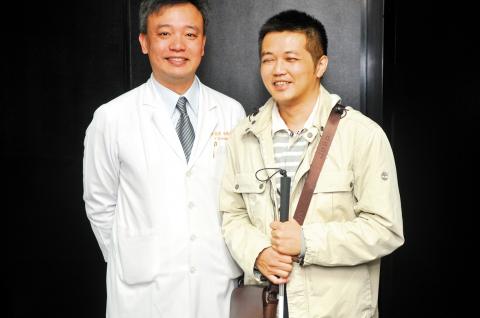A man successfully underwent surgery for electronic eyes last month, Linkou Chang Gung Memorial Hospital said on Thursday, and doctors expect to connect the device to a power source by the end of the month.
The “eye” functions like a miniature camera, said Huang Yi-hsiu (黃奕修), a doctor at the hospital’s Artificial Electronic Eye Center in the Department of Ophthalmology.
Surgeons implanted microcomputers, antennae and microchips in the 41-year-old patient’s eyes, which are to send signals to the brain through active optical nerves.

Photo courtesy of Linkou Chang Gung Memorial Hospital
The antennae receive wireless signals sent by a pair of glasses, which serve as lenses would in a camera, Huang said.
The electronics are minuscule and would not cause the patient discomfort, Huang said, adding that they are charged wirelessly.
Patients in other countries have worn similar devices that have been effective for at least nine years, Huang said, adding that the patient, surnamed Kao (高), would be able to “see” and live his life after two or three months of therapy.
The method is only able to restore vision to a hazy 0.01 — as though a mosaic effect has been applied, or like colorless images from early cameras — but it is still a significant improvement for nearly blind patients, Huang said.
Now these people could see where they are walking and what eating utensils they need, Huang said, adding that they could also see well enough to avoid walking into poles or walls.
Some patients might see the wrong shapes — like blocks instead of the ball they were asked to hold during tests — and therefore must continue to undergo therapy until their visual memories return, Huang said, adding that for now, they should use touch to help with their rehabilitation.
Huang said that at this rate, artificial eye technology would improve rapidly over the coming years.
However, not everyone is eligible for the procedure, Huang said.
People whose optic nerves have not completely atrophied and can still see some dim light, or who have been blind for a short time, could undergo the surgery, Huang said, adding that it costs NT$9 million (US$296,809).
Huang said that Kao was selected for the procedure because he is younger and was only nearly blind for two years, and because it was funded by the Hung Lu Foundation.
Kao had to leave his job as a supervisor at a construction company after he developed retinal dystrophy and went nearly completely blind.

The Ministry of Education (MOE) is to launch a new program to encourage international students to stay in Taiwan and explore job opportunities here after graduation, Deputy Minister of Education Yeh Ping-cheng (葉丙成) said on Friday. The government would provide full scholarships for international students to further their studies for two years in Taiwan, so those who want to pursue a master’s degree can consider applying for the program, he said. The fields included are science, technology, engineering, mathematics, semiconductors and finance, Yeh added. The program, called “Intense 2+2,” would also assist international students who completed the two years of further studies in

Former president Tsai Ing-wen (蔡英文) departed for Europe on Friday night, with planned stops in Lithuania and Denmark. Tsai arrived at Taiwan Taoyuan International Airport on Friday night, but did not speak to reporters before departing. Tsai wrote on social media later that the purpose of the trip was to reaffirm the commitment of Taiwanese to working with democratic allies to promote regional security and stability, upholding freedom and democracy, and defending their homeland. She also expressed hope that through joint efforts, Taiwan and Europe would continue to be partners building up economic resilience on the global stage. The former president was to first

Former president Tsai Ing-wen (蔡英文) on Monday called for greater cooperation between Taiwan, Lithuania and the EU to counter threats to information security, including attacks on undersea cables and other critical infrastructure. In a speech at Vilnius University in the Lithuanian capital, Tsai highlighted recent incidents in which vital undersea cables — essential for cross-border data transmission — were severed in the Taiwan Strait and the Baltic Sea over the past year. Taiwanese authorities suspect Chinese sabotage in the incidents near Taiwan’s waters, while EU leaders have said Russia is the likely culprit behind similar breaches in the Baltic. “Taiwan and our European

The Taipei District Court sentenced babysitters Liu Tsai-hsuan (劉彩萱) and Liu Jou-lin (劉若琳) to life and 18 years in prison respectively today for causing the death of a one-year-old boy in December 2023. The Taipei District Prosecutors’ Office said that Liu Tsai-hsuan was entrusted with the care of a one-year-old boy, nicknamed Kai Kai (剴剴), in August 2023 by the Child Welfare League Foundation. From Sept. 1 to Dec. 23 that year, she and her sister Liu Jou-lin allegedly committed acts of abuse against the boy, who was rushed to the hospital with severe injuries on Dec. 24, 2023, but did not